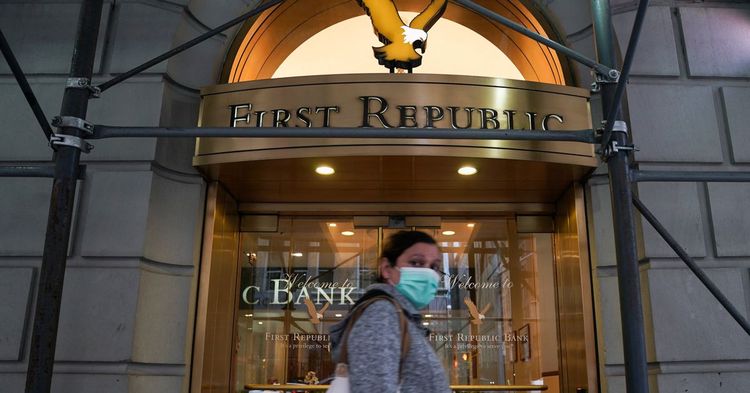First Republic shares dive on contagion fear, dragging U.S. regional ...

[1/2] A person walks past the Park Avenue location of the First Republic Bank, in New York City, U.S., March 10, 2023. REUTERS/David 'Dee' Delgado
March 13 (Reuters) - Shares of U.S. regional banks slumped on Monday, led by sharp losses in First Republic Bank (FRC.N) as news of fresh financing failed to assuage fears of possible bank contagion following the collapse of SVB Financial Group (SIVB.O) and Signature Bank (SBNY.O).
San Francisco-based First Republic has been able to meet withdrawal demands with the help of additional funding from JPMorgan Chase & Co (JPM.N), the mid-cap lender's executive chair, Jim Herbert, told CNBC.
Herbert's comments, however, did little to keep the stock afloat. There were multiple trading halts as shares tumbled, last down 67% at $28.05.
In response to Reuters queries, a bank spokesperson said the bank is “continuing to fully serve the needs of our clients by opening accounts, making loans, executing transactions ... at our offices and online.”
Other regional lenders also tumbled, with Western Alliance (WAL.N), KeyCorp (KEY.N), Comerica Inc (CMA.N), Huntington Bancshares Inc (HBAN.O) and PacWest Bancorp (PACW.O) down between 16% and 29%.
View 2 more stories
There were multiple trading halts on bank shares as the KBW regional banking index (.KRX) fell 5.4%, and the S&P 500 banking index (.SPXBK) dropped 6%.
"The real issue for the industry is that there is a crisis of confidence in the stickiness of deposits and when that becomes dislocated, things can move very quickly," said Christopher McGratty, head of U.S. Bank Research at investment bank KBW.
U.S. President Joe Biden vowed to do whatever was needed to address a potential banking crisis. On Sunday, national regulators took emergency measures to maintain confidence in the system, and First Republic secured additional financing through JPMorgan and the U.S. Federal Reserve, gaining access to a total of $70 billion in funds.
Despite the cash infusion, Raymond James double downgraded the bank's stock, highlighting the risk of deposit outflows that First Republic faces from panicked large depositors after the bank run at SVB.
Founded in 1985, First Republic had $212 billion in assets and $176.4 billion in deposits as of the end of last year, according to its annual report.
About 70% of its deposits are uninsured, which is above the median of 55% for medium-sized banks and the third highest in the group after Silicon Valley Bank and Signature Bank, according to a Bank of America note.
Bank of America slashed its price target on the stock to $90 from $140.
The banking rout, which follows several Fed interest rate hikes over the past year, has pushed down yields on the 2-year Treasury note by the most since the financial crisis of 2008.
Art Hogan, chief market strategist at B. Riley Wealth, said the market is "finding out in real time what the risk of rising interest rates at such a fast pace can do to the balance sheets of some of the regional banks”.
Hogan said each regional bank has its own exposure to different parts of the market. “For example, if you're a regional bank that's exposed to commercial real estate, well, then office real estate isn't a positive ... in the energy crisis you saw all the regional banks in Texas come under pressure because of their exposure to oil.”
He added the fate of regional bank stocks will be "case by case" as investors look to see which ones could have the most negative exposure. Other traders wondered whether the panic could become self-fulfilling, pushing people to move funds from smaller lenders to bigger banks.
Among Wall Street lenders, Bank of America Corp (BAC.N) dropped 3.3%, Citigroup Inc (C.N) and Wells Fargo (WFC.N) slid about 6% each, while lenders in Asia and Europe plunged too.
The U.S. system of Federal Home Loan Banks (FHLB), which lends to banks and other member financial institutions primarily to help them make mortgages to consumers, is seeking to raise about $64 billion by selling short-term notes, Bloomberg News reported.
Reporting by Medha Singh in Bengaluru, Tatiana Bautzer in New York; Editing by Shinjini Ganguli and David Gregorio
Our Standards: The Thomson Reuters Trust Principles.













































